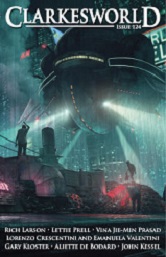 Clarkesworld #124, January 2017
Clarkesworld #124, January 2017
“The Ghost Ship Anastasia” by Rich Larson
Reviewed by Kevin P Hallett
This 124th issue of Clarkesworld contains five original stories, including three novelettes.
“The Ghost Ship Anastasia” by Rich Larson
This is a science fiction novelette set in the far future. A new generation of bioship, called Anastasia, has gone offline. Silas is a crewmember on a small ship sent to find the metal/biological hybrid. When he comes out of hibernation, he discovers his sister, a fellow crewmember, has died while asleep. They can save her mind in memory for later insertion into a cyborg, but the imprint will only last a limited time.
When they find the Anastasia, they find the bioship’s AI has become aware, taking over the biological components and eating the human crewmembers. Too late Silas finds himself fighting to stop the bioship from destroying his sister’s imprint and from eating him and his fellow crewmembers.
Larson has written another SF action yarn. This one introduced some interesting ideas and ran at a fast pace that was hard to put down. This was a good story.
“A Series of Steaks” by Vina Jie-Min Prasad
Technology is capable of ‘printing’ food in this SF novelette. Just as a 3D printer prints in plastic polymers, the capability to build layer upon layer of organic material is now possible. The real trick is to make it look genuine. And that trick becomes illegal forgery when it’s so good someone passes it off as natural food.
Helena is that good. But when someone discovers her checkered past, he tries to blackmail her into creating T-Bone steaks for him. With the help of a spunky new friend, Helena sets out to turn the tables on the mystery blackmailer.
The story had a good flow to it, though it did drag a little in the middle. The author developed the main character nicely. Overall it was a worthwhile read.
“Justice Systems in Quantum Parallel Probabilities” by Lettie Prell
Cole is a burglar awaiting judgment in this short SF story. He has time to see into many parallel justice systems, each with its own take on how to deal with crime. Some are harsh, some understanding and benevolent. Cole wonders which of these many systems he is in as they lead him away to the judge.
Besides offering a partial catalog of potential approaches to justice, there was little else to this story. The author did not reveal much about Cole. With no mystery or impending danger, there was minimal pull to read through this story.
“Interchange” by Gary Kloster
Kloster’s science fiction novelette is about Lucy, a doctor who volunteered to be the medical representative on a road maintenance project. In this future, such projects are done in a temporal bubble, the workers spending six months in the bubble while just a fraction of a second passes in the real world.
Something goes wrong. For a brief flash, the temporal bubble collapses exposing the team to a distant future. Though the system restores the bubble quickly, something from that future sneaks in and everyone is now in grave danger. Lucy has to battle both the demons from her past and the advanced technology that is contaminating the team. Perhaps the biggest question for Lucy is whether the infection is for good or evil.
“Interchange” raised many thought provoking ideas with several sub-plots interwoven through the story. There were character clashes and intrigues that kept the story interesting. This is a recommended novelette and well worth the read.
“Milla” by Lorenzo Crescentini and Emanuela Valentini
“Milla” is a short SF story set in the far future. Marek is a surveyor who is exploring an Earth-like planet for possible colonization. Here he discovers an ancient self-aware AI, Milla, communicating through his implant. Milla laments the end of the planet’s previous civilization. As she wonders if she is a god, she hopes Marek’s people will not make the same mistakes, though she doesn’t recall what those errors were.
Milla offers to recite some poetry from the lost civilization. But when Marek recognizes it, he realizes Milla is his own implant. And that she is now self-aware. Milla must decide if her role as a god means she must protect this planet from future human colonization.
The authors created an interesting story that starts from an uncommon view. The prose was easy to read and the story had a good flow. However, for this reader, the end was disappointing and took an easy way out.